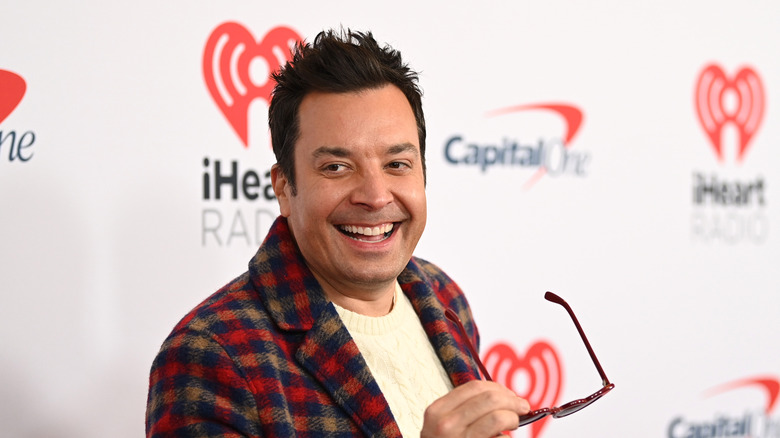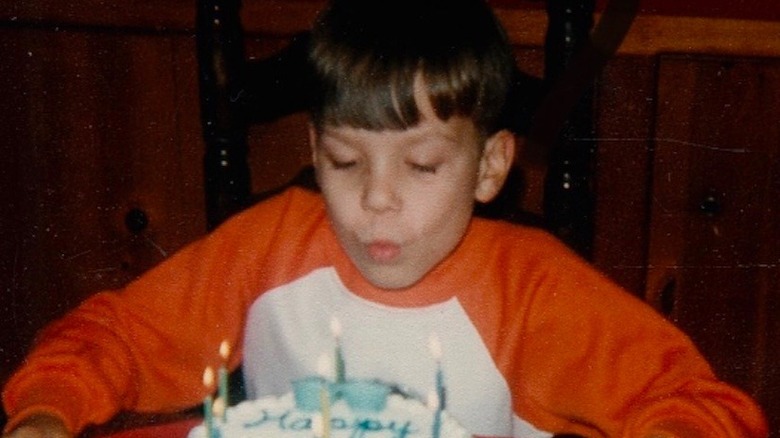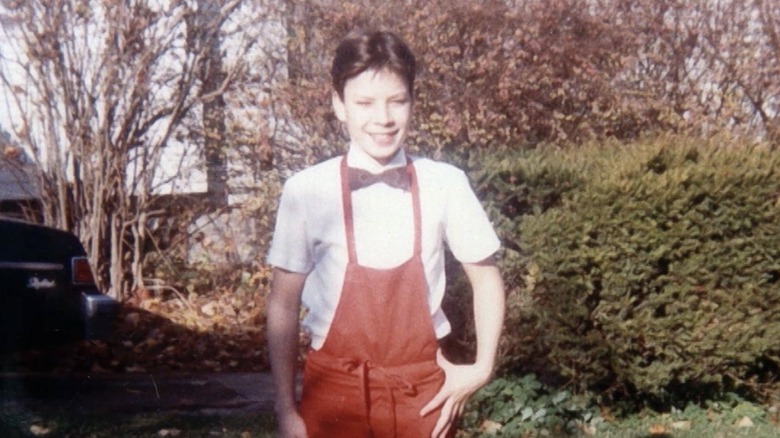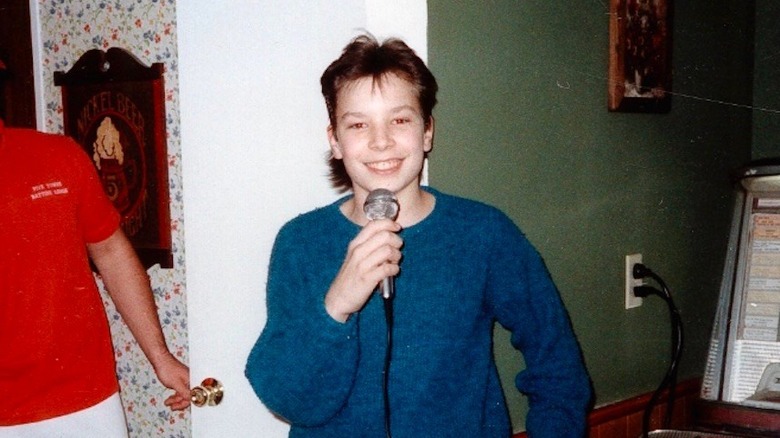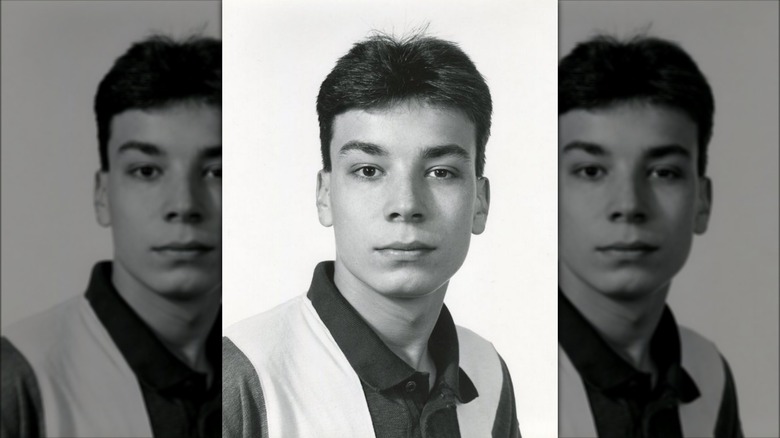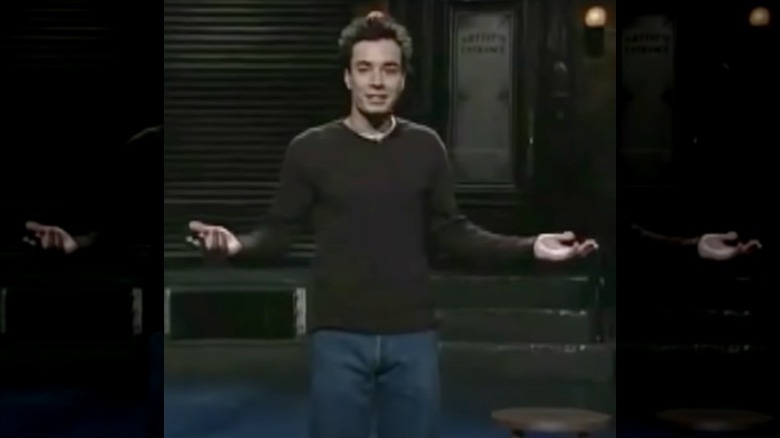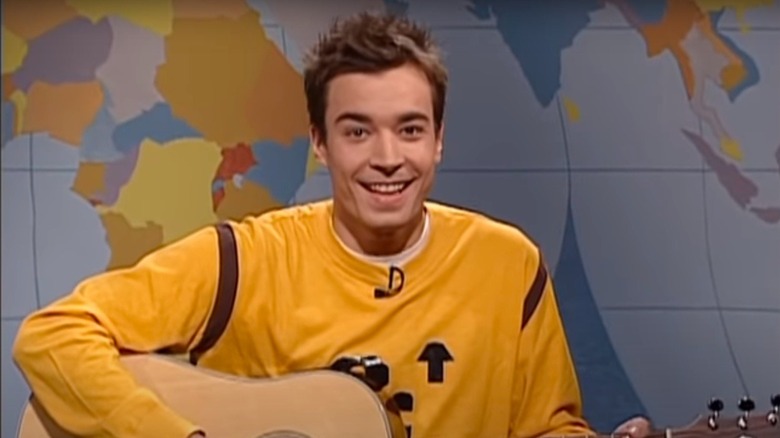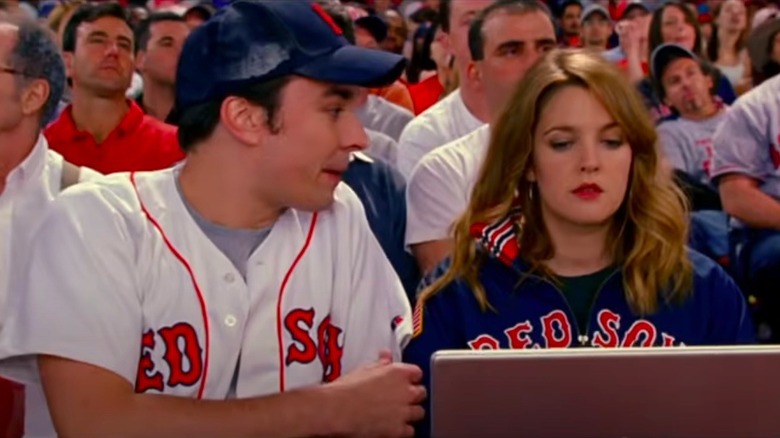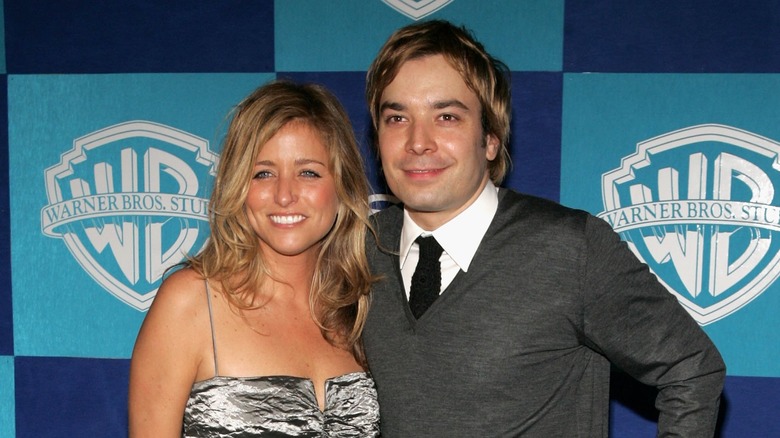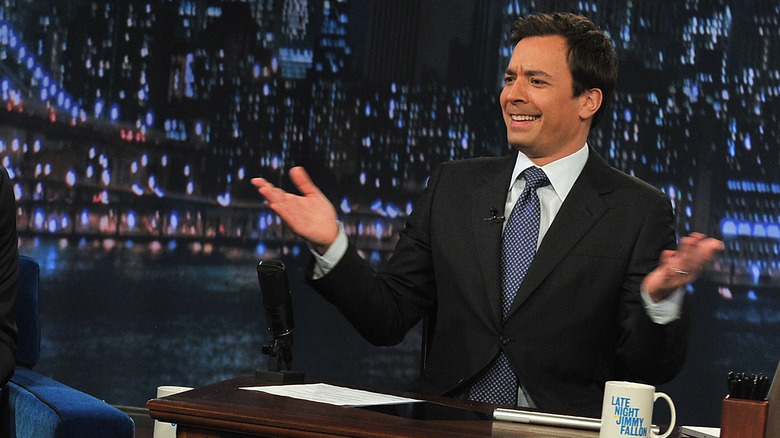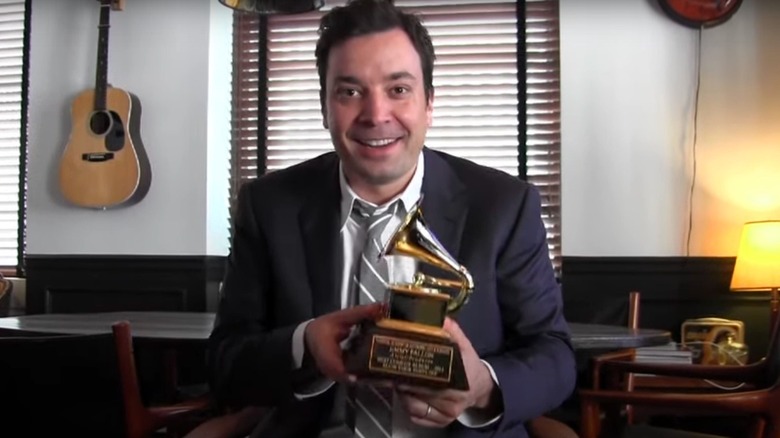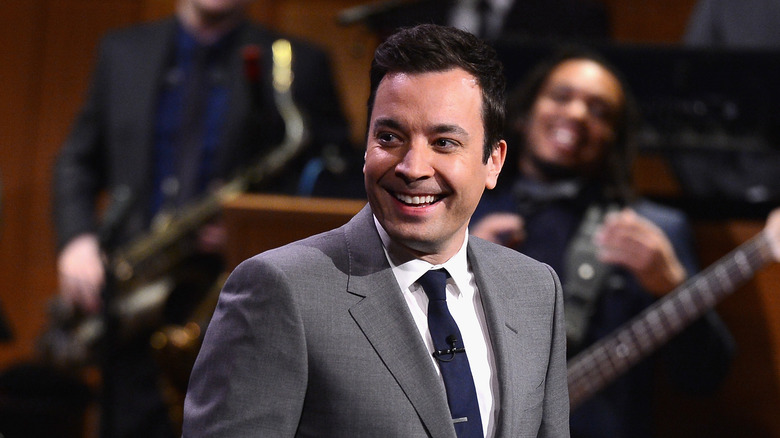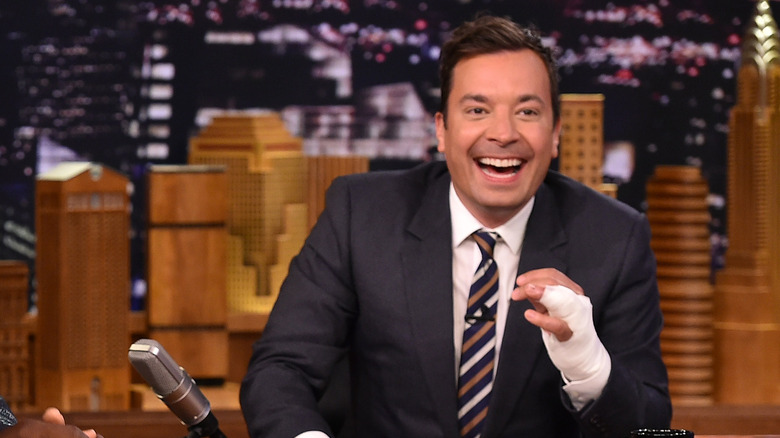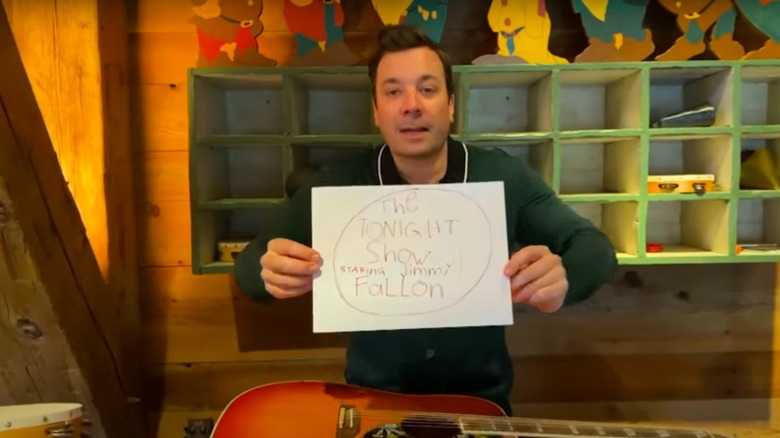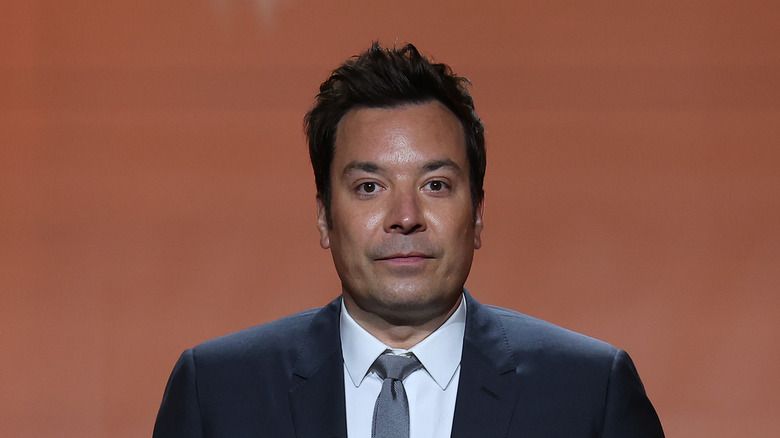The Stunning Transformation Of Jimmy Fallon
For more than two decades, Jimmy Fallon has been delivering a steady stream of laughs to television viewers. Looking back at how the host of "The Tonight Show Starring Jimmy Fallon" wound up at the pinnacle of late-night television, his rise to the top of the comedy world, in retrospect, now seems somewhat inevitable. He's starred in movies and television and even ventured into the world of audio-only comedy albums. He's a husband, father, and entertainment mogul who's produced his own TV series (comedic game shows "Lip Sync Battle," and "That's My Jam," for example, with Fallon serving as both host and executive producer on the latter).
When delving into the history of his comedy career, it's easy to see that making people laugh has always been part of Fallon's DNA. From cracking up his family as a kid to entertaining millions of television viewers, Fallon has long been aware of what his life's work is supposed to be. "I'm meant to make people happy. That's my job," he mused in an interview with NPR's "Fresh Air." That's what I'm supposed to do, I think, on this earth ... I'm going to do whatever I can to make people happy."
From his early days as a comedy-obsessed kid to his sketch show fame to his numerous years as a late-night talk show host, Jimmy Fallon has had quite a wild ride.
Jimmy Fallon's childhood was 'idyllic'
While the laughter generated by some comedians often comes from a place of anger and pain, relating bitingly funny recollections of family dysfunction and trauma, that's not the case with Jimmy Fallon. "I know it's odd for a comedian," Fallon told NPR's "Fresh Air," but insisted, "I think I really did have a happy childhood. I was always a happy kid." That characterization is seconded by Fallon's sister, Gloria, who recalled growing up in a stable environment with loving, supportive parents. "We had an idyllic childhood," Gloria told Vanity Fair. "My grandparents were so happy, everyone in the family was funny, and there was no divorce, no unemployment — we were lucky."
The Fallon siblings' grandparents, in fact, lived in a small cottage in the backyard. "My grandparents helped raise me, you know?" Fallon told "Fresh Air," remembering spending a lot of time with them while growing up — and that they even taught him how to drive. As a result, the atmosphere in which Fallon and his sister grew up was somewhat insular and perhaps a bit too protective. "We weren't even allowed to cross the street on our own until we were 10 or 12," Gloria told Vanity Fair.
Young Fallon gravitated to comedy early on, and before long, he began immersing himself in it, listening to the novelty songs played on "The Dr. Demento Show" and discovering the iconic absurdity of "Monty Python's Flying Circus."
Teenage Jimmy Fallon was obsessed with SNL
When Jimmy Fallon entered adolescence, the next stage in his comedy education came when he discovered "Saturday Night Live," the groundbreaking sketch-comedy series launched in the mid-1970s. By the late 1980s, the show had already become something of an institution and then featured a cast that included the likes of Phil Hartman, Dana Carvey, Jan Hooks, and Jon Lovitz.
Watching the show as it aired live on Saturday nights was something that Fallon approached with a near-religious level of devotion; in fact, he told Vanity Fair, he insisted on watching all by himself, insisting on absorbing every bit of nuance without the distraction or interruptions of someone else. "I just didn't want anyone ruining my experience," he explained. "No small talk. I wanted to see the sketches, the new characters, what the angle was." At a certain point, Fallon's parents allowed their underage son to enjoy a few beers while watching "SNL." "I'd just sit by myself, and I would have a six-pack of Pabst," Fallon recalled, saying he usually didn't drink all six.
Fallon wasn't just watching the show as a fan but viewed each episode with a singular goal in mind: he wanted to be a cast member. "I always said I want to be on 'SNL' before I'm 27," he revealed in an interview with Associated Press. "It was almost to the point of craziness. I just thought, 'I gotta get on.'"
Winning a local comedy competition put him on the road to stardom
Jimmy Fallon took a big step toward his comedy dreams when his mother told him about an impression contest at a local comedy club, which she'd heard about on the radio. Having heard her son doing impressions in his bedroom, she encouraged him to enter and give it a shot. Requiring three minutes of material, Fallon came up with the idea of using a Troll doll as a framing device to showcase his impressions of Jerry Seinfeld, John Travolta, and other celebrities. Just 17 years old, Fallon wound up winning the contest at Bananas Comedy Club in Poughkeepsie, New York — which was accompanied by a cash prize he recalled being $700.
"Like, wow, is comedy this easy?" Fallon told NPR's "Fresh Air." "I mean, I can just do three minutes and get $700. Like, that's amazing. This is what I want to do for the rest of my life."
As Fallon began to pursue opportunities to perform comedy in front of a live audience, he quickly discovered that $700 for a three-minute performance was the exception, not the rule, with actual comedy gigs paying significantly less. Still, the experience had left him hooked. He began competing in talent shows and became the weekend emcee at the same comedy show where he debuted his Troll doll act. "On weekends, I would do stand-up, adding more voices and then eventually adding music," Fallon told USA Today.
He headed to Hollywood to make his mark
During his senior year attending the College of St. Rose in Albany, New York, Jimmy Fallon sent out a tape of his stand-up comedy and some headshots he'd had taken and wound up being invited to Los Angeles. Just 15 points away from graduation, Fallon told his parents he wanted to drop out of school and head to Hollywood to launch his comedy career. They supported his decision, pulling together as much money as possible, and sent him on his way.
Fallon stayed with a friend for a few months, sleeping on the couch until he eventually got his own place. "I did improv, I took classes at The Groundlings, I was very lucky out there. I got to do a lot of cool things," he told USA Today. During this period, he landed his first acting role, a bit part on the sitcom "Spin City." He also performed stand-up at the famed comedy club, The Improv, where he was paid a measly $7.50 per set.
While Fallon began making a name for himself in the L.A. comedy scene, he had not wavered from his ultimate goal of becoming a "Saturday Night Live" cast member. Before long, all his hard work in Hollywood would pay off when an opportunity arose to audition for a spot on "SNL."
His first SNL audition was a disaster, but his second was legendary
Based on the strength of the tape he'd sent producers, Jimmy Fallon landed an audition for "Saturday Night Live." "So I went to the Comic Strip in New York City, and I did my Troll doll act, and I totally bombed it, and it was terrible," he told USA Today, recalling that Tracy Morgan was hired while he was not.
Though understandably devastated by seeing his lifelong dream evaporate before his eyes, Fallon received a call from "SNL" producers the following year, inviting him to take another kick at the can — but advising him to ditch the Troll doll and come up with something new. He followed that advice and tried again. Before his audition, he was told repeatedly not to be discouraged if "SNL" creator Lorne Michaels didn't laugh — because he never laughed during auditions. "And I made Lorne laugh — he put his head in his hands, and he laughed, and I thought, 'Wow!'" Fallon recalled.
Fallon's audition landed him a spot in the cast and remains the gold standard in "SNL" auditions. Also in the room for that audition was Tina Fey, who recalled Fallon being fully formed as a comedy talent. "He's one of two people I've ever seen who was completely ready to be on the show. Kristen Wiig is the other one." Fey told Vanity Fair. "And Jimmy was ready — like if there had been a show to do that night."
He quickly became an SNL standout
Jimmy Fallon joined "Saturday Night Live" in 1998 for the show's 24th season. It didn't take long for the energetic 23-year-old to make an impression on viewers. He'd already become a star by his fourth episode, thanks to his comedic musical performances and his pitch-perfect impression of former cast member Adam Sandler. "SNL" creator Lorne Michaels recognized how quickly and enthusiastically viewers had embraced Fallon. "The people who pop first on this show are the ones who you believe you can see right into their hearts," Michaels told New York Magazine back in 1999. "It was true of Gilda [Radner], it was true of John Belushi, and it's true of Jimmy. You just feel you know them." At that time, Fallon was still coming to grips with becoming the new breakout star. "I've never really gotten this response before," he admitted. "I was never, like, the hot guy at the bar. I'm still not the hot guy at the bar."
In 2000, Fallon received the ultimate "SNL" seal of approval when he and Tina Fey were tapped to co-host the series' iconic spoof news segment, Weekend Update. "There's chemistry," Michaels told Entertainment Weekly of his decision to pair the two behind the Weekend Update desk.
Becoming a member of the "Saturday Night Live" cast exceeded Fallon's expectations, fulfilling his childhood dreams while also making him a star in his own right.
His attempt at a post-SNL movie career fizzled
Jimmy Fallon announced he was leaving "Saturday Night Live" during the show's season finale in 2004. Following in the footsteps of numerous "SNL" alums before him, Fallon was ready to make the jump to movie stardom.
Fallon had already appeared in a few films — most notably a small role in "Almost Famous" — but now he was ready for leading roles. The first came in the 2004 film "Taxi," in which he played a rookie cop who teams up with a feisty cab driver, played by Queen Latifah. He followed that up in the baseball-themed rom-com "Fever Pitch," playing a Boston Red Sox superfan opposite Drew Barrymore. Neither film did particularly well at the box office, taking in $71 million and $50 million, respectively.
For Fallon, the door to Hollywood that opened from his "SNL" success closed just as quickly. "I got two shots at major movies. They didn't open. Nothing you could do. It just didn't work," Fallon told Vanity Fair, admitting that his failure to register on the big screen left him unmoored during what was a particularly bleak time in his career. "I was probably drinking more than I should have been drinking," he admitted. "It wasn't, like, sitting and watching old tapes of me on 'SNL' with the screen flickering in front of me. But I was like: 'I can't figure out what I want to do.'"
He married Nancy Juvonen and started a family
While "Fever Pitch" may have been the final nail in the coffin of Jimmy Fallon's film career, the movie continues to hold a special place in his heart. That's because, while filming, he got to know Nancy Juvonen, co-owner of Flower Films production company, alongside Drew Barrymore. Fallon had met Juvonen a few years earlier when she accompanied Barrymore while she hosted "SNL," but it was on the "Fever Pitch" set that the two connected in a meaningful way. "You came to set ... [in] white pants, a pink sweater, and a green backpack ... blonde hair and your white teeth," Fallon recalled on "The Tonight Show." "You just stood out in this gray [background], almost like a painting. You stood out like a neon ... And you were just so fun — we had so much fun on that [set], didn't we?"
In August 2007, Fallon and Juvonen got engaged. When the couple had the opportunity to spend a few days on a tropical island owned by billionaire Sir Richard Branson, they decided to ditch plans for a large ceremony down the road and instead have an impromptu wedding, tying the knot in December of that same year.
In 2013, the spouses welcomed their first child, daughter Winnie Rose. Their second daughter, Frances Cole, arrived the following year. Both children were born via surrogacy.
He returned to television to host Late Night
Jimmy Fallon's movie career may have floundered, but "Saturday Night Live" creator Lorne Michaels had other plans for him. That came into focus in 2008, when NBC announced Fallon would become the new host of "Late Night" (which Michaels produced), taking over for outgoing host Conan O'Brien.
While hosting a late-night show was new territory for Fallon, Michaels felt his non-competitive style of comedy made him a natural. "He never felt diminished by other people being funny. The opposite. He enjoyed when other people were funny," Michaels told Vanity Fair, comparing that particular personality trait to the rapport his legendary "Tonight Show" predecessor, Johnny Carson, had with guests. NBC network executives weren't so sure. "NBC waffled for a little bit, they're like, 'Is Jimmy Fallon the guy we want?'" Fallon told USA Today. Michaels, however, stuck to his guns, wielding his clout at the network. "He said, 'If you don't do it with Jimmy, I won't produce,'" Fallon recalled.
Fallon was initially just as hesitant as the network was until his wife, Nancy Juvonen, encouraged him to at least give it a try. "Nancy was like, 'You've got to try it ... If it doesn't work, it doesn't work,'" Fallon recalled to Vanity Fair. He was, however, up for the challenge. "I'm ready to work really hard," Fallon said during a press conference (via New York Post).
His comedy album won a Grammy
By 2012, Jimmy Fallon had more than found his footing hosting "Late Night" when he released his second comedy album, "Blow Your Pants Off." Featuring musical comedy bits taken from the show, the album featured a who's who of musical guests, including Bruce Springsteen, Paul McCartney, Pearl Jam frontman Eddie Vedder, Justin Timberlake, and many more. As Fallon told Entertainment Weekly, the origin of the song parodies that made up the album stemmed from his childhood interest in novelty songs. "I just like funny songs. I collect comedy records," Fallon explained. "I have probably every comedy record that was made in the '60s and '70s."
The album brought Fallon his very first Grammy, taking home the award for best comedy album at the 55th annual Grammy Awards; his first album, 2003's "The Bathroom Wall," had also received a Grammy nomination but didn't win.
"As a kid, you dream about this kind of stuff," Fallon said in a taped acceptance speech he shared via video. "You see Michael Jackson holding these, you see Paul McCartney holding these, and you go, 'Oh my God, cool.' And now I'm holding one of these."
He got big promotion as host of The Tonight Show
In 2013, after several years hosting "Late Night," Jimmy Fallon received a big promotion when he was tapped to host "The Tonight Show," arguably the most prestigious gig in late-night television. "Today was one of the most exciting days of my life," Fallon tweeted in response to the news. This time, there was no hesitancy from the network; Fallon was now a proven commodity, having interviewed the world's biggest stars and carved out his own unique space within the late-night landscape. Even Paul McCartney believed Fallon would bring a fresh energy to "The Tonight Show." "He's a major fan of people, and that's very endearing when you're working with him," McCartney told Vanity Fair. "It comes across to the audience too — here's this guy who has the same enthusiasms as you, but he happens to have his own talk show."
In addition to Fallon as host, another big change was the network's announcement that "The Tonight Show" — which had been broadcast from Burbank, California for decades — would be returning to New York City, coming to viewers from the Big Apple for the first time in more than 40 years. When Fallon made his debut as host of the retitled "The Tonight Show Starring Jimmy Fallon," it was an auspicious one; his first episode drew a whopping 11.3 million viewers, the show's second most-watched episode in half a decade.
He almost lost his finger in a freak accident
In 2015, Jimmy Fallon was forced off the air when he suffered a bizarre accident at his home. As he recounted for the Los Angeles Times, he tripped on a braided rug; as he fell, his wedding ring became caught on a countertop, nearly ripping his entire finger off. "I tripped and fell, and I caught my fall, so I'm getting up, and my finger is sideways. So I go, 'Oh my God, did I just break my finger?" he said. He didn't; instead, he experienced ring avulsion, in which his ring became caught and partially pulled his finger off his hand. After undergoing complex microsurgery to reattach the partially severed digit, Fallon was forced to sit out "The Tonight Show" for two weeks.
When he returned to the show, he was sporting a large splint on his injured finger with his hand bandaged. Addressing the accident, he admitted to viewers he was lucky that he didn't lose the finger entirely. "Apparently, the odds aren't great ... and usually they just cut your finger off," Fallon said during his first night back, noting he still had a long recovery ahead. "I won't get feeling back for eight weeks," he added.
His mangled finger was still healing when he spoke with Billboard about the injury, revealing he needed to undergo a second surgical procedure. "It's a bummer," he said, "but you can't get depressed."
He hosted The Tonight Show from home during the pandemic
When Americans were asked to socially distance by quarantining at home during the COVID-19 pandemic, Jimmy Fallon was among those who began working from home. While "The Tonight Show" reruns aired on NBC, Fallon quickly pivoted, producing his own at-home shows that were posted on YouTube. Interviewing celebrity guests via Zoom while wife Nancy Juvonen served as camera operator — and their two young daughters as on-air sidekicks — Fallon's low-tech take on a late-night talk show charmed viewers during a very fraught period. Eventually, NBC axed the reruns and began airing his self-shot shows on network television.
As Fallon explained to Entertainment Weekly, simply doing nothing while quarantining with his family simply wasn't an option. "I said, 'I have to do something. I just can't go off the air and disappear.' People need something just to balance with all this craziness that's happening right now," he said, explaining why he initially launched his efforts on social media. It didn't take much arm-twisting to get his writers on board. "All of my writing staff and my producers were like, 'Let's put on a show!'"
He finally returned to his studio a few months later with various health and safety precautions in place. Putting together those shows for all those months, he told People, had been a revelatory experience. "It was like taking a course in communications or filmmaking," he said. "It was definitely challenging. Definitely scary. But we did so much this past year."
He responded to some shocking allegations about the treatment of Tonight Show staffers
Jimmy Fallon found himself at the center of an unexpected scandal with the September 2023 publication of a Rolling Stone exposé based on the allegations of former and current employees. According to those staffers, Fallon had fostered a "toxic workplace" where employees regularly fled to private rooms to cry.
Fallon himself was accused of unpredictable mood swings that had staff walking on eggshells around him. "You never knew which Jimmy we were going to get and when he was going to throw a hissy fit," a former "The Tonight Show" employee told the magazine, while another added, "It was like, if Jimmy is in a bad mood, everyone's day is f***ed."
According to a CBS News report, Fallon addressed the allegations made to Rolling Stone during a Zoom meeting with staff. "It's embarrassing, and I feel so bad," Fallon reportedly told his staff. Meanwhile, other employees contacted Entertainment Tonight to dispute the allegations made to Rolling Stone. "I've had an incredible time working at the show," said one staffer. They declared that the Rolling Stone piece had "misrepresented" what it was like to work there. Even Jerry Seinfeld, who was purported by the magazine to be uncomfortable with Fallon's treatment of a cue-card handler, blasted the article. "Idiotic twisting of events," Seinfeld said in a statement to RS, obtained by Variety.

